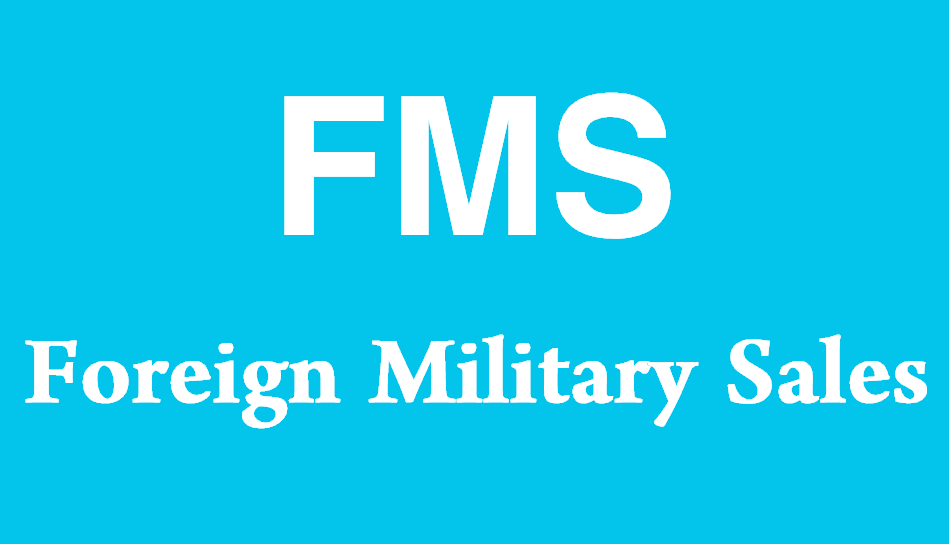What does FMS stand for?
FMS stands for Foreign Military Sales. This U.S. government program facilitates the sale of defense articles, services, and training to foreign governments and international organizations. Managed by the Defense Security Cooperation Agency (DSCA), FMS supports U.S. foreign policy and national security goals by strengthening the defense capabilities of allies and partners, promoting interoperability, and fostering long-term military relationships.

Comprehensive Explanation of Foreign Military Sales
Definition and Purpose
What is Foreign Military Sales (FMS)?
Foreign Military Sales (FMS) is a government-to-government program through which the United States sells defense equipment, services, and training to allied and partner nations. The program is administered by the Defense Security Cooperation Agency (DSCA), which operates under the U.S. Department of Defense (DoD). FMS aims to strengthen U.S. foreign policy objectives, enhance the defense capabilities of allies, and promote global security and stability.
Objectives of FMS
The primary objectives of the FMS program are to:
- Enhance Global Security: Strengthen the military capabilities of allied and partner nations to promote regional and global security.
- Support U.S. Foreign Policy: Align foreign military sales with U.S. foreign policy goals and strategic interests.
- Promote Interoperability: Ensure that the defense systems of allied and partner nations are compatible with U.S. military systems to facilitate joint operations.
- Foster Long-Term Relationships: Build enduring military-to-military relationships and enhance cooperation with partner nations.
Legal and Regulatory Framework
Legislation Governing FMS
The FMS program is governed by several key pieces of legislation, including:
- Arms Export Control Act (AECA): This law provides the legal basis for the sale of defense articles and services to foreign countries. It requires that sales align with U.S. foreign policy and national security interests.
- Foreign Assistance Act (FAA): This act authorizes the provision of military assistance to foreign nations and supports the objectives of the FMS program.
- Defense Security Cooperation Agency (DSCA) Regulations: DSCA issues guidelines and procedures for implementing the FMS program, ensuring compliance with U.S. laws and policies.
Approval Process
The FMS process involves several steps, including:
- Request for Proposal (RFP): A foreign government submits a formal request for defense articles or services to the U.S. government.
- Letter of Request (LOR): The foreign government submits an LOR to the DSCA, outlining its requirements and desired outcomes.
- Letter of Offer and Acceptance (LOA): The DSCA reviews the LOR and prepares an LOA, which details the terms and conditions of the sale. The foreign government must sign the LOA to formalize the agreement.
- Congressional Notification: For significant sales, the U.S. Congress must be notified and given the opportunity to review and approve the transaction.
- Contract Implementation: Once the LOA is accepted, the DSCA oversees the procurement, delivery, and support of the defense articles and services.
Components of FMS
Defense Articles
FMS includes the sale of various defense articles, such as:
- Aircraft: Fighter jets, transport planes, helicopters, and unmanned aerial vehicles (UAVs).
- Naval Vessels: Warships, submarines, and patrol boats.
- Ground Vehicles: Tanks, armored personnel carriers, and utility vehicles.
- Weapons Systems: Missiles, artillery, and small arms.
Defense Services
In addition to defense articles, FMS encompasses the provision of defense services, including:
- Training: Military training programs for personnel, covering areas such as operation, maintenance, and tactics.
- Technical Support: Maintenance, repair, and logistical support for defense equipment.
- Advisory Services: Strategic and operational advice to enhance the effectiveness of partner nations’ military forces.
Financial Aspects
The financial arrangements for FMS transactions include:
- Pricing: FMS transactions are typically conducted on a cost-recovery basis, meaning the foreign government pays for the actual costs incurred by the U.S. government.
- Financing Options: Various financing options are available, including foreign military financing (FMF) grants and loans, national funds, and third-party financing.
Benefits of FMS
Strengthening Alliances
FMS strengthens alliances and partnerships by enhancing the military capabilities of allied nations. This promotes regional stability and enables allies to contribute more effectively to collective defense efforts.
Promoting Interoperability
By providing allies with U.S.-compatible defense equipment and training, FMS ensures interoperability during joint operations and coalition missions. This enhances the effectiveness of multinational military efforts.
Supporting U.S. Defense Industry
FMS supports the U.S. defense industry by providing additional markets for defense products and services. This helps sustain production lines, supports high-tech jobs, and promotes technological innovation.
Enhancing Global Security
FMS contributes to global security by building the capacity of partner nations to address common security challenges, such as terrorism, piracy, and regional conflicts. This reduces the burden on U.S. forces and promotes a more stable international environment.
Challenges and Criticisms
Bureaucratic Complexity
The FMS process can be complex and bureaucratic, involving multiple agencies and lengthy approval procedures. This can lead to delays and increased costs for both the U.S. and foreign governments.
Political Considerations
FMS transactions are influenced by political considerations, including foreign policy objectives and bilateral relations. This can lead to challenges in balancing strategic interests with commercial opportunities.
Compliance and Oversight
Ensuring compliance with U.S. laws, regulations, and policies is critical to the success of FMS. Rigorous oversight is necessary to prevent misuse of defense articles and services and to ensure that sales align with U.S. national security interests.
Case Studies
FMS to Saudi Arabia
Saudi Arabia is one of the largest recipients of U.S. defense articles and services through the FMS program. Significant sales have included advanced fighter jets, missile defense systems, and naval vessels. These transactions have enhanced Saudi Arabia’s military capabilities and strengthened U.S.-Saudi relations.
FMS to South Korea
South Korea has benefited from numerous FMS transactions, including the sale of aircraft, ground vehicles, and missile defense systems. These sales have bolstered South Korea’s defense posture and supported regional stability in the face of North Korean threats.
FMS to Poland
Poland has acquired advanced defense systems through FMS, including Patriot missile defense systems and F-35 fighter jets. These transactions have enhanced Poland’s defense capabilities and contributed to NATO’s collective security efforts.
Future Trends
Expanding Partnerships
The FMS program is likely to expand to include new partner nations, particularly in regions facing emerging security challenges. This will enhance global security and promote U.S. foreign policy objectives.
Technological Advancements
Advances in defense technology will drive the evolution of FMS. Emerging technologies, such as cyber defense, artificial intelligence, and autonomous systems, will become increasingly important in future FMS transactions.
Strengthening Oversight
Enhanced oversight and accountability mechanisms will be necessary to ensure that FMS transactions align with U.S. national security interests and comply with legal and regulatory requirements. This will involve greater transparency and rigorous monitoring of end-use.
Notes to Importers
Understanding FMS’s Impact on Importing
Importers of defense articles and services must understand the FMS program’s implications for their operations. This includes compliance with U.S. regulations, managing logistics, and ensuring proper use of imported defense products.
Key Considerations for Importers
Compliance with Regulations
Importers must ensure compliance with U.S. laws and regulations governing FMS transactions. This includes adherence to end-use monitoring requirements, export controls, and reporting obligations.
Logistics and Delivery
Effective logistics management is crucial for the successful delivery of defense articles and services. Importers should coordinate closely with U.S. agencies and contractors to ensure timely and secure delivery.
Training and Support
Importers must arrange for the necessary training and support to operate and maintain imported defense equipment. This may involve coordinating with U.S. military advisors and contractors to provide comprehensive training programs.
Sample Sentences Using FMS
- “The FMS program facilitates the sale of advanced defense systems to allied nations, enhancing their military capabilities.”
- Meaning: The Foreign Military Sales program helps allied countries acquire advanced defense equipment to strengthen their military forces.
- “Through FMS, the U.S. government provides comprehensive training and support services to partner nations.”
- Meaning: The Foreign Military Sales program includes training and support to help partner countries effectively use the defense equipment they purchase.
- “The approval process for FMS transactions involves multiple steps, including congressional notification and review.”
- Meaning: The Foreign Military Sales process requires several stages, such as informing and getting approval from Congress.
- “FMS transactions are conducted on a cost-recovery basis, ensuring that foreign governments pay the actual costs incurred by the U.S.”
- Meaning: In Foreign Military Sales, the foreign buyer covers the real expenses incurred by the U.S. government.
- “The FMS program promotes interoperability by providing allies with U.S.-compatible defense equipment and systems.”
- Meaning: The Foreign Military Sales program helps allies use defense systems that work well with U.S. military equipment.
Other Meanings of FMS
| Acronym | Full Form | Description |
|---|---|---|
| FMS | Field Management System | A software system used for managing field operations and personnel. |
| FMS | Financial Management System | An integrated system for managing an organization’s financial processes. |
| FMS | Fleet Management System | A system used to manage a company’s vehicle fleet, including maintenance and logistics. |
| FMS | Force Main Sewer | A type of sewer line that transports wastewater under pressure. |
| FMS | Flexible Manufacturing System | A production system that can easily adapt to changes in the type and quantity of products being manufactured. |
| FMS | Flight Management System | An onboard computer system used in aviation to manage and control flight operations. |
| FMS | Facility Management Services | Services related to the maintenance and operation of buildings and facilities. |
| FMS | Functional Movement Screen | A screening tool used to assess movement patterns and identify functional limitations. |
| FMS | Fixed Mobile Substitution | A telecommunications strategy where mobile services replace fixed-line services. |
| FMS | Full Mission Simulator | A high-fidelity simulator used for training military personnel in realistic scenarios. |
| FMS | Financial Market Supervisory | An authority responsible for overseeing and regulating financial markets. |
| FMS | Fast Memory System | A type of computer memory designed for high-speed data processing. |
| FMS | Foot and Mouth Syndrome | A viral disease affecting livestock, particularly cattle and swine. |
| FMS | Follow-Me System | An automated system that allows vehicles or robots to follow a leader or predefined path. |
| FMS | Frequency Modulation Synthesis | A method of sound synthesis used in electronic music and sound design. |
| FMS | Flexible Mortgage Solution | A type of mortgage product that offers flexible payment options and terms. |
| FMS | Foreign Market Strategy | A strategy for entering and competing in international markets. |
| FMS | Faculty of Medical Sciences | An academic division within a university specializing in medical education and research. |
| FMS | Fault Management System | A system used in telecommunications and IT to detect, diagnose, and resolve faults. |
| FMS | Federal Mediation Service | A government agency providing mediation and conflict resolution services. |




